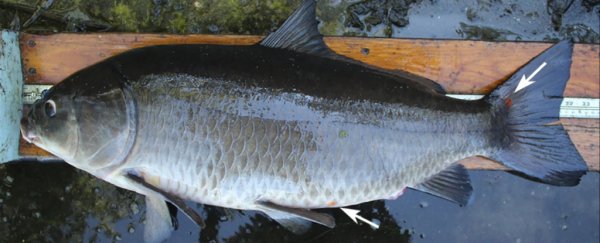When Grandma Fish was just a tiny fry, the Titanic was yet to set sail. Humans had yet to reach the South Pole. The First World War wasn't even a rumble on the horizon, the first public radio broadcast yet to spill its arias into New York City.
As new dating techniques have revealed, one venerable bigmouth buffalo (Ictiobus cyprinellus) - we're calling her Grandma Fish - lived to be around 112 years old. That's older than the species' previous estimated life expectancy of 26 years, by more than a factor of four.
Moreover, this newly discovered age exceeds the life expectancy of any known freshwater fish by nearly 40 years. (The oldest known saltwater fish - and vertebrate - is the Greenland shark (Somniosus microcephalus), which can live for centuries.)
Sadly, the same techniques that revealed the tremendous longevity of these fish have also revealed their desperate straits. But what we've learned from the death of Grandma Fish could help save the species.
Biologists had suspected that bigmouth buffalo might live for longer than we knew, so they set out to discover just how old these animals can get.
Between 2011 and 2018, they caught a large number of fish for data collection. Some of the specimens were photographed, measured, sexed, and tagged before being released back in the wild, so the team could measure changes over time.
Another 386 specimens weren't so lucky, and were dissected to determine their age. The researchers took thin shavings of their otoliths - calcium carbonate structures in the ears of bony fish that help them balance.
Otoliths are a bit like trees, in that a new layer is added at regular intervals; these can be counted to estimate the animal's age, although an additional method is useful, since the intervals can vary from fish to fish.
In this study, the otolith rings gave an initial result of 80 to 90 years - a stunning number, since until then, the oldest freshwater bony fish was a freshwater drum (Aplodinotus grunniens), whose otolith, obtained from an archaeological site, returned an age of 73 years.
To verify the initial result on their bigmouth buffalo, the researchers then used bomb carbon dating, a technique that exists thanks to the atomic bomb testing in the middle of the 20th century. Those bomb tests doubled the amount of carbon-14 in the atmosphere before it slowly receded to pre-testing levels.
Biologists looked for carbon-14 in the rings of the otoliths they collected to determine how old the fish is, which allowed them to confirm the initial counts.
 Otolith sample from Grandma Fish. (Lackmann et al., Communications Biology, 2019)
Otolith sample from Grandma Fish. (Lackmann et al., Communications Biology, 2019)
The oldest - as you already know - was Grandma Fish at 112 years. Which is amazing.
But between 85 and 90 percent of some of the populations of fish the researchers studied were over 80 years old. And that indicates a problem.
"We document numerous populations that are comprised largely of individuals over 80 years old, suggesting long-term recruitment failure since dam construction in the 1930s," they write in their paper.
"Dams on rivers are cited as the leading cause of recruitment failure for bigmouth buffalo because they restrict access to spawning habitats and can mute the environmental cues thought to initiate spawning behaviour."
In other words, some populations of the fish aren't producing young - and it looks like human activity, once again, is to blame.
Bigmouth buffalo are the largest of the buffalo fish found in North and Central America, growing over 1.25 metres (4.1 feet) in length and 36 kilograms (79 pounds) in weight.
It's native to the US and Canada, but is often lumped in with "rough fish" such as invasive species or carp, undesirable to anglers; as such, its harvest is largely unregulated, even though its numbers are in decline.
The researchers hope that this discovery about its longevity will inspire greater appreciation for a misunderstood species.
"The bigmouth buffalo is capable of living and reproducing to ages that more than quadruple all previous estimates," they wrote.
"This finding serves as a prime example of discoveries overlooked and management dilemmas that can arise as a consequence of the ecological neglect of under-appreciated species."
Yeah. You listen to Grandma.
The research has been published in Communications Biology.
